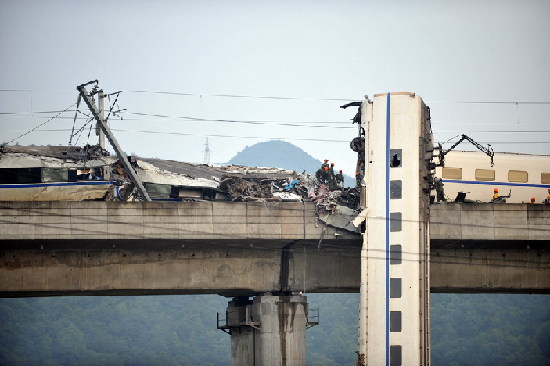From Titanic to high speed trains
- By Xu Peixi
 0 Comment(s)
0 Comment(s) Print
Print E-mail
China.org.cn, July 30, 2011
E-mail
China.org.cn, July 30, 2011
|
|
|
China train crash death toll rises to 40 |
What used to be seen as almost impossible occurred: a high-speed train rear-ended another train in Wenzhou on July 23. Railroad workers, regardless of how senior they are, were astonished by the disaster after putting in multiple layers of protection against such a possibility. They really believed in their safety system.
It is important to understand that we can draw the most acute lesson by rethinking our relationship with technology, a technological challenge that was interpreted by Cees Hamelink in the metaphor of the Titanic. An unsinkable ship sank. At the time, it was the largest and best-equipped trans-Atlantic liner. Numerous factors contributed to this disaster and its severity: the crew's lack of experience, the indifferent attitude of the ship's officers towards warnings of icebergs, the ship owners' lowering of safety standards to save costs.
| Don't miss: |
| ? Train crash reminder of social responsibility |
| ? Weibo posts on the Wenzhou train crash |
| ? Mismanaging the crisis |
For Hamelink, the Titanic metaphor represents "a strong belief in the perfection of technology." "The modern technological culture demonstrates a strong drive towards a risk-free society," he said. "This aspiration to achieve a risk-free control of social processes is seriously hampered by the unpredictable, fickle human species."
How did the train collision happen? It remains under investigation, but many traces compiled from diverse accounts told us that it repeated many features of the Titanic precedent. Train conductors had little training. Certain unimportant components of the railroad system were possibly produced cheaply.
The first thing for us to do is de-enchant a blind belief of technological solutions to our daily life matters. Let us treat trains as trains and planes as planes. They are not divine, holy symbols representing the rapid advancement of modernization, no matter how fast they are. The same is true with other infrastructures such as hydropower, nuclear, solar and wind power. There is no need to recall our best-written ancient poems to paint a mythical color over these symbols. Japan's lesson from its nuclear crisis was bitter enough; Germany's complete walk-away from certain technology also came from heightened ideologies. China's solution perhaps lies somewhere in between.
The instantaneous uprising of Weibo users arose not only from a fact of train collision but also from the suspicious way that the Ministry of Railways handled this devastating disaster: the alleged burial of some wreckage, the misplaced priority between saving lives and re-opening service, the arrogance in giving compensations, and above all, the reluctance to communicate with a fully mobilized public. These are rightful suspicions but need to be complemented with our reflections on the role of technology. Otherwise, we saw only the trees but missed the wood.
Xu Peixi is a columnist with China.org.cn. For more information please visit: http://www.formacion-profesional-a-distancia.com/opinion/xupeixi.htm.
Opinion articles reflect the views of their authors, not necessarily those of China.org.cn






